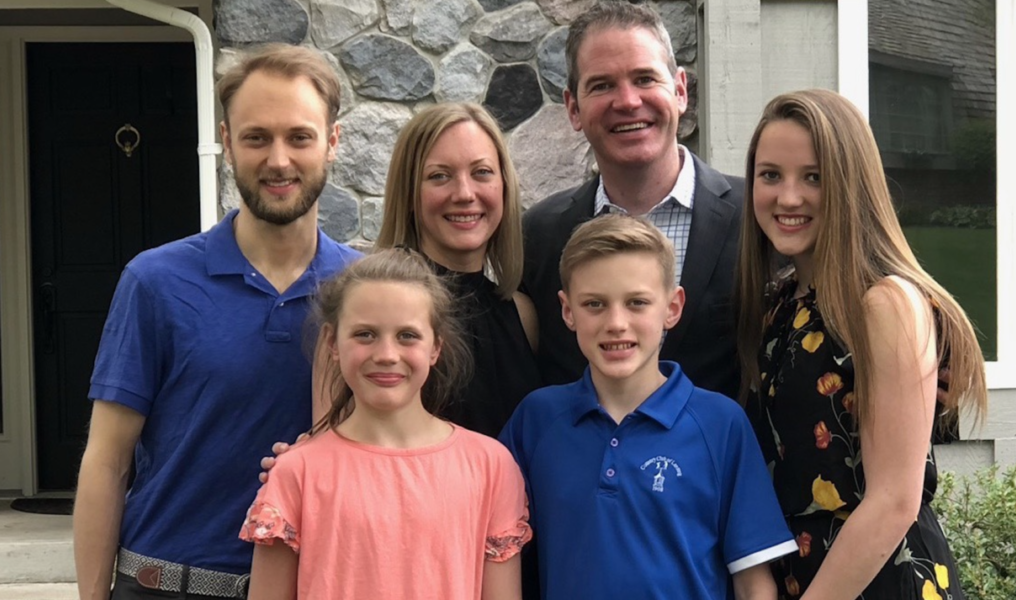An Unlikely Scenario
Why would Between The Lines request an interview with a Republican justice on the Michigan Supreme Court? To begin with, Justice Elizabeth Clement, like many in the judiciary, would bristle at labeling judges Republican or Democrat. Yet in Michigan, justices are elected, not appointed, and they are nominated by party — although their names appear on the nonpartisan section of the ballot.
Appointed by Gov. Rick Snyder in 2017, Clement spent a 1 1/2 years on the bench prior to the 2018 midterm elections; therefore, she had a record to evaluate. And consider this: should you and your partner split, and your custody battle becomes part of a case that makes its way up to the highest court in the state, Clement could be one of seven justices deciding the future of your family.
Controversy
"I wanted to wake up the day after the election whether I won or lost, knowing I had done my job the right way."
—Justice Elizabeth Clement, regarding her ruling on Proposal 2
In the run up to the 2018 election, Clement was praised by some and vilified by others for her independent streak during her short tenure on the Michigan Supreme Court. Given that she was nominated by the Republican Party, worked for Republican politicians, and was endorsed by conservative groups, there were certain expectations.
Nevertheless, she, along with one other Republican-nominated justice, voted with the two Democrats on the court in a case that challenged the fitness of Proposal 2 for the ballot, which passed, thus enabling voters to decide whether to end gerrymandering in Michigan and establish an independent redistricting commission. For that, plus her decision in a case that permitted schools to ban guns on school property, she was booed at her party's nominating convention, there was talk of choosing another nominee and her name was removed from campaign literature. In the end, endorsed by both The Detroit News and the Detroit Free Press, she was the top vote-getter of the four candidates on the ballot for two available seats.
At the same time, some point to the fact that Clement served in the Snyder administration from 2011 to 2016, during the early years of the Flint water crisis. She stated that she has, and will continue to, recuse herself from cases involving Flint. Regarding other matters during her time there — she served in succession as deputy legal counsel, deputy chief of staff, legal counsel and chief of staff — she will evaluate and make decisions about recusal as they arise, she said.
A New Era for the Michigan Supreme Court?
The Michigan Supreme Court ranked dead last in independence in a 2008 study conducted by the University of Chicago School of a Law — a finding that came as no surprise to many attorneys actively practicing in Michigan at the time, and since. That is, certain justices were unquestionably influenced by partisan pressures. Eleven years later, Clement said she hopes the current justices have the same desire she does: to keep politics out of the equation.
"I think our court looks very different than it did 10 years ago," she said. "And I think the public is going to continue to see that direction … [where] it doesn't matter who nominated them. They're making decisions as a collective body, based on the law, based on the facts."
As an example, she described when the court nominated Bridget McCormack as Chief Justice.
"… the story was, four Republican-nominated justices, three Democrat-nominated justices and a Democrat is now the chief. How did that happen?" Clement recalled. "I'll be frank, it happened because we picked the best person for the job. And it was unanimous."
Democratic-nominated Megan Cavanagh is the newest addition to the court and Clement said that "we are so lucky to have her."
She called Cavanagh hard-working, open-minded and down-to-earth.
"It's great for the chief justice and I to have another woman on the court," she said, and reflected on the changes she's witnessed since January, describing the group as collegial, respectful when they disagree and commented on the "renewed excitement" she sees.
Child Welfare
After graduating from Michigan State University Law School, Clement began her legal career in private practice, focusing on family law. That was part of her interest in serving on the court, an interest she described as twofold.
"My passion has also been researching and writing, and I've always been kind of an introvert," she said, adding that she has had to come out of her shell somewhat in her new role.
And while that is a significant part of her job, she explained that each of the seven justices also serve as liaisons with oversight over the state's trial courts.
"… the other part of my job is acting as a liaison for the Michigan Supreme Court for problem-solving courts," she said, "which involves mental health issues, drug addiction, alcohol addiction and our veterans, as well as our child welfare system as it relates to the foster care system."
She called the ability to be involved with both parts of her legal career that she has been passionate about "an amazing opportunity."
Given Clement's background in family law, she was well-versed in Michigan's equitable parent doctrine, which relates to parenting rights for one's nonbiological children. This can be a challenging issue in custody disputes, and its impact on the LGBTQ community, in particular, cannot be overstated. Marriage equality has shifted the landscape somewhat; however, Michigan remains the only state that recognizes the parent-child relationship solely in the context of a legal marriage. Knowing that she could not weigh in, either way, we asked Justice Clement whether she would be interested in the Michigan Supreme Court taking up a case to look at this issue in the future.
"Yes," she replied. "Having said that … we have statutes today that do not account for what families look like in general. And I think there is a lot of work that can and should be done across the board. Whether it's custody and parenting time and all of that, when it comes to any family, regardless of what the makeup of that family looks like.
"In my mind, we don't want the court stepping into each and every different situation … [because] there's never gonna be a perfect case that will cover all of it, just address a piece of it," she continued. "And we're gonna be left with questions."
She said she believes there are legislators who are passionate about this issue and hopes they will educate people on the need for statutes that protect parents and children, "because families look very different than they did when these laws were enacted years and years ago."
The foster care system is an institution whose role is to protect children. And policies that allow foster and adoption agencies to discriminate on the basis of sexual orientation, gender identity, religion, etc. have been a minefield for the state. As court liaison, Clement said she's witnessed this herself.
"I don't know that you can balance them," she said, when asked if she envisioned a workable solution. "Do you get to discriminate against a gay couple, or do you get to discriminate against an organization that has religious beliefs? … This is something that is definitely happening in our state, where there's agencies that have very strong beliefs that they should be able to select foster parents or adoptive parents based on set criteria."
She added, "I anticipate that a case could very well percolate up to our court."
Author's Note: The day following our interview, Attorney General Dana Nessel reversed the state's policy which allowed state-contracted agencies to discriminate against LGBTQ couples. Whether this is settled remains to be seen.
Bottom Line
How Justice Clement might rule on issues that affect LGBTQ Michiganders is not yet known, and she is the first to acknowledge that. She only asks that the community consider her record and the value she places on open-mindedness.
"I tell people that I am a listener," she said. "Someone that does not have their mind made up, that does not bring bias or their personal opinion to a case. But someone that rather is prepared, looks at the law, looks at the cases and then comes and listens. … One of my favorite things is talking to my colleagues that share their perspective on something, and get me to see something in a way that I wasn't looking at it before.
"I feel that every single person, regardless of anything about their background or who they are today or what they believe in deserves to be treated the exact same as the next person that walks into a courtroom," she continued. "And that's just who I am at my core. So I would hope that your readers would actually afford me the same. That if they have questions, they want to get to know me, invite me to things or ask me to come speak. Because I don't think there's anything that divides us.
Clement said also that although she can't answer specific questions on how she would rule on a case, her track record shows that she is an open-minded justice.
"I can't answer specific questions on how I would rule on a case, and until those cases come before the court, they're not gonna have that confidence that they see it in practice, but I think that there's enough cases out there in the last year and a half they can look to and say, ‘It doesn't matter what her career path was here, or who she worked for, this is who she is as a justice, and what she's telling us is her philosophy on how to do her job and who she is as a person.' And at least be willing to be open-minded to me as well."
Outtake
"You're gonna print this and I'm gonna get in big trouble, and I just don't care. Ruth Bader Ginsburg," Clement said, when asked to name the sitting U.S. Supreme Court Justice she most admires and why. "She's a rock star. I know everything about her, I've read every book about her, I've watched every documentary, every movie. She, to me, as a woman, as a woman in the law, as the mother of four children … she's amazing, she's brilliant, she's hard-working … the trailblazer for women, not just in the law, but for women everywhere. And men, too."











